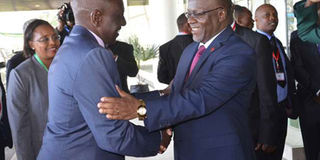Kenya urges regional states to sign trade deal with EU

Tanzania President John Pombe Magufuli welcomes Kenya's Deputy President William Ruto to the EAC Heads of State and Government Summit in Dar es Salaam on September 8, 2016. PHOTO | DPPS
What you need to know:
- Kenya’s Deputy President William Ruto met three Heads of State and a Burundian Minister in Dar es Salaam, Tanzania on Thursday, to convince Tanzania and Burundi to sign the Economic Partnership Agreement (EPA).
- Mr Ruto represented President Uhuru Kenyatta at a summit that was to agree on the way forward for signing, ratification and implementation of the East African Community (EAC) –European Union (EU), Economic Partnership Agreement.
Kenya has appealed to other East Africa states, especially Tanzania, to endorse a regional trade deal with the European Union that will allow the region’s exports to the European market tax free.
Kenya’s Deputy President William Ruto met three Heads of State and a Burundian Minister in Dar es Salaam, Tanzania on Thursday, to convince Tanzania and Burundi to sign the Economic Partnership Agreement (EPA).
Mr Ruto represented President Uhuru Kenyatta at a summit that was to agree on the way forward for signing, ratification and implementation of the East African Community (EAC) –European Union (EU), Economic Partnership Agreement.
Tanzania president John Pombe Magufuli, Uganda’s Yoweri Museveni, Rwanda’s Paul Kagame and Burundi’s Minister for External Relations and International Cooperation Ambassador Alain Aime Nyamitwe attended the 17th Extra-ordinary Summit of EAC Heads of State.
The agreement allows the EAC to export its products, mainly flowers and perishable goods to the EU without attracting any tax.
It also provides duty free and quota free market access to all EAC exports to the EU.
Kenya has been on a charm offensive to try to have the agreement signed by the EAC member states.
Mr Ruto said the agreement had given the EAC a lot of credibility and had assisted the region to attract investments.
He said backtracking on the agreement would erode the credibility the region has built over the last 20 years.
“This will negatively affect prospective trade arrangements with other countries,” he said.
He said EPAs had given the region a strong position in trade negotiations.
He argued that it would be dangerous for the region to adopt different trade regimes by failing to sign EPAs when it is easy to engage any partners as a bloc.
Kenya and Rwanda had signed the trade deal in Brussels last week while Uganda, which had indicated willingness to sign it today, urged Tanzania and Burundi to sign too.
Tanzania has reneged on the deal arguing that it was analysing it while Burundi got furious after European countries slapped an aid embargo on the country following its disputed elections and subsequent violence.
Tanzania had also said that it would be scouting for her own industrial prospects.
On Wednesday, Tanzania said it will not enter into an agreement with the EU and urged other EA states to delay the signing to allow for time to dsicuss on the effects of the deal on the region’s manufacturing sector.
The signing of the EPAs by Kenya and Rwanda and soon Uganda, however, does not mean the full agreement is ready for implementation. It will only come into effect when all EAC partner states sign and ratify it.
The EPA recognizes EAC as one party, which have to act collectively. It does not give partner states the flexibility to engage the EU under the EPAs individually.
East African Principal Secretary Betty Maina had prior to the summit indicated that Kenya may drop the two countries to resolve the deadlock.
The agreements must be signed before October 1 this year.
However, in July, the EU members of parliament had said they would push for an extension of the deadline to let Kenya lobby her neighbours to sign the deal.



